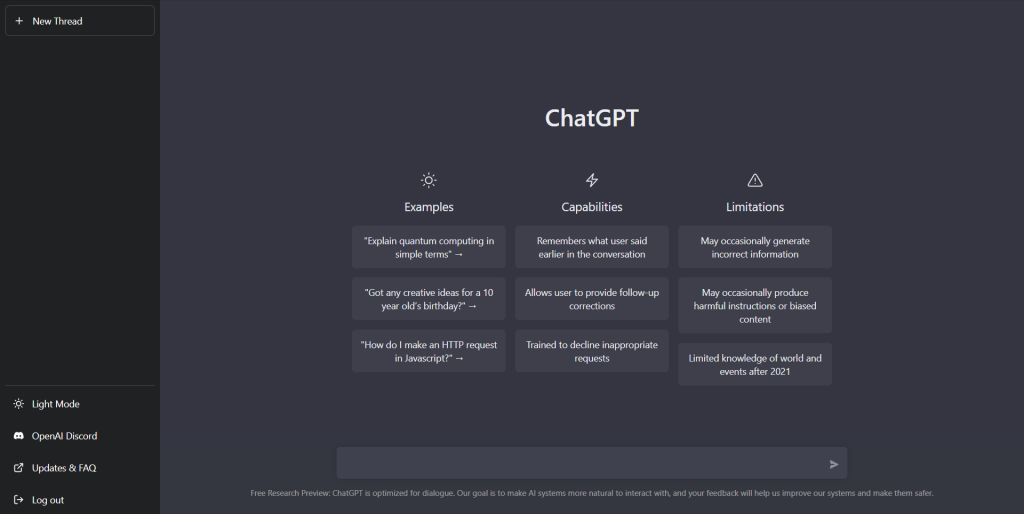What is ChatGPT? A Complete Guide to OpenAI’s Conversational AI Overview of ChatGPT
ChatGPT is a generative AI chatbot developed by OpenAI, first launched on November 30, 2022. It quickly became the fastest-growing consumer software in history, reaching 100 million users in just two months. Based on Generative Pre-trained Transformer (GPT) models, the latest flagship is GPT-5. ChatGPT offers conversational interactions, text, audio, image generation, and a wide range of applications.
Key Highlights:
Conversational AI for human-like interactions.
Multimodal abilities: text, audio, and images.
Content generation: essays, code, music, and business ideas.
Web search integration for up-to-date responses.
How ChatGPT Works
Generative Pre-trained Transformer (GPT)
GPT models learn from vast amounts of text data to generate human-like responses. ChatGPT uses this architecture to understand context, answer questions, and follow multi-step reasoning.
Reinforcement Learning from Human Feedback (RLHF)
Human AI trainers provide conversation examples.
Responses are ranked and fine-tuned using reward models.
Improves accuracy, relevance, and conversational quality over time.
Deep Learning & Neural Networks
Utilizes transformer neural networks.
Self-attention mechanisms allow understanding of long contexts.
Iterative improvements enhance safety and usability.
Key Capabilities of ChatGPT
1. Conversational AI
ChatGPT can answer follow-up questions, admit mistakes, and provide natural dialogue.
2. Content Generation
Essays, scripts, and poetry
Programming and code debugging
Music composition and storytelling
Social media posts and emails
3. Multimodal Interaction
Supports text, audio, and image input/output. Users can type, speak, or upload images for analysis or generation.
4. Problem Solving
Text summarization
Test question answers
Logical and multi-step reasoning
5. Web Search Integration
Since October 2024, ChatGPT can search the web to provide accurate, up-to-date answers with relevant links.
ChatGPT Models and Features
Model Versions:
GPT-3.5: Initial model.
GPT-4: Introduced advanced capabilities, image processing.
GPT-4o (“Omni”): Multilingual, multimodal, faster.
o1: Optimized for complex reasoning.
GPT-5: Flagship model with built-in reasoning; GPT-5 mini for high-demand users.
Advanced Features:
Canvas: Interactive space for text/code iteration.
Reasoning Models: Step-by-step logical analysis.
Multimodal Mode: File uploads, image interactions.
Search Feature: Real-time web search for latest trends.
Agents & Custom GPTs: Automate tasks, specialized assistants.
Voice Mode: Real-time conversations with emotion detection.
Applications Across Industries
Education: Personalized learning, summarization, language skills.
Computer Science: Coding, debugging, algorithm solutions.
Cybersecurity: Threat detection, automation, reporting.
Arts & Culture: Writing, music, film scripts.
Law: Drafting bills, legal motions.
Medicine: Education, research, clinical decision support.
Finance: Investment analysis, stock predictions.
Limitations and Criticisms
Accuracy & Hallucinations: May produce plausible but incorrect answers.
Bias: Reflections of training data can cause algorithmic bias.
Knowledge Cut-off: Limited knowledge without web search.
Verbosity & Repetition: Sometimes overly long answers.
Ethical Concerns: Misinformation, academic dishonesty, copyright issues, privacy, job displacement, environmental impact.
Accessibility & Pricing
Free Tier: Limited GPT-5 access, web search, basic multimodal features.
ChatGPT Plus ($20/month): Extended messaging, file uploads, voice, GPT-4.5 preview.
ChatGPT Pro ($200/month): Unlimited reasoning models, advanced voice, GPT-4o, o1 pro mode.
Enterprise/Team/Edu Plans: Tailored for organizations with higher usage limits.
Apps & Integrations: iOS, Android, Apple ecosystem, WhatsApp, and phone calls.
FAQ
1. What is ChatGPT?
ChatGPT is an AI chatbot that generates human-like responses and content across multiple formats.
2. How does ChatGPT learn?
It uses GPT models trained on internet data, fine-tuned via human feedback (RLHF).
3. Can ChatGPT generate images and audio?
Yes, newer versions like GPT-5 support text, image, and audio generation.
4. Is ChatGPT free to use?
Yes, with limitations. Paid tiers unlock advanced features and extended access.
5. What are the risks of using ChatGPT?
Risks include inaccuracies, bias, misinformation, and ethical concerns like plagiarism or privacy issues.


